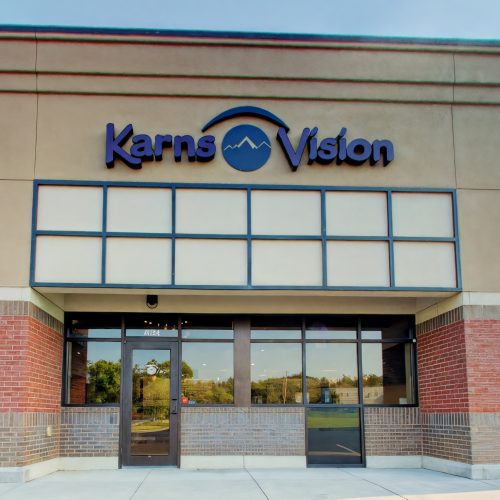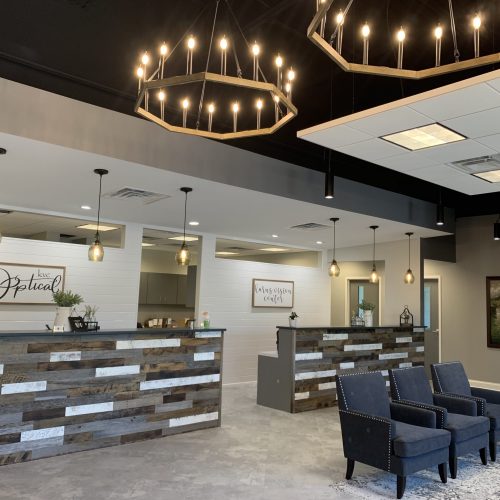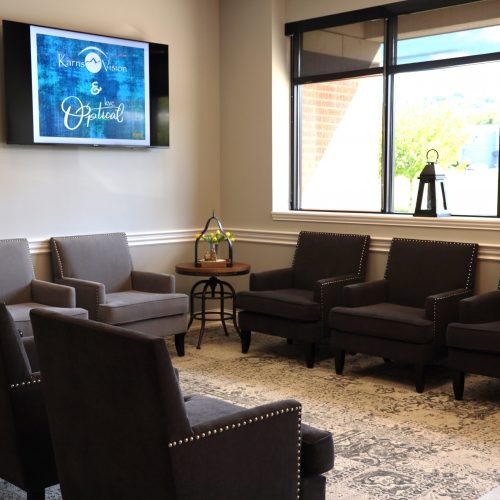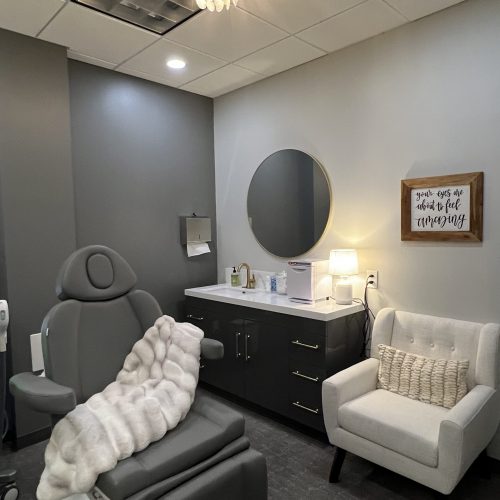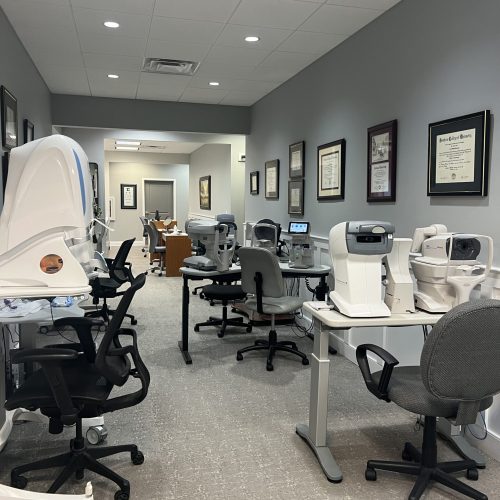Knoxville Tennessee Optometry
When routine tasks like reading become challenging, or familiar faces start to appear blurry, these changes might indicate the early stages of age-related macular degeneration (AMD). As one of the leading causes of vision loss among adults over 50, macular degeneration affects millions of people, yet early detection and proper management can significantly slow its progression and help preserve your precious central vision.
At Karns Vision Center, we understand how concerning vision changes can be, especially when they interfere with the activities you love most. Our comprehensive approach to macular degeneration screening combines advanced diagnostic technology with compassionate, personalized care. We’re committed to helping our Knoxville community understand this condition, recognize early warning signs, and access the most effective treatments available to protect their vision for years to come.
Age-related macular degeneration (AMD) is an eye disease that affects the macula, the small central portion of your retina responsible for sharp, straight-ahead vision. The macula contains millions of light-sensitive cells that allow you to see fine details clearly, making it possible to read, drive, recognize faces, and perform close-up work. When macular degeneration occurs, these cells gradually deteriorate, leading to progressive loss of central vision while typically leaving peripheral vision intact.
How AMD Affects Your Vision: Unlike other eye conditions that may cause complete blindness, macular degeneration primarily affects your central visual field. This means you’ll retain your peripheral vision, allowing you to navigate safely through familiar spaces. However, the loss of central vision can significantly impact daily activities that require fine detail recognition, such as reading small print, threading a needle, or distinguishing facial features.
The Progressive Nature of AMD: Macular degeneration is a progressive condition, meaning it typically worsens gradually over time. The rate of progression varies significantly among individuals, with some people experiencing slow changes over many years while others may notice more rapid vision loss. Understanding this progressive nature helps explain why early detection and ongoing monitoring are so crucial for maintaining your quality of life.
Dry AMD accounts for approximately 85-90% of all macular degeneration cases, making it the most common form of this condition. This type develops when small yellow deposits called drusen accumulate beneath the macula, causing the retinal tissue to gradually thin and deteriorate over time.
Early Stage: Small drusen deposits form under the retina, usually without causing symptoms. Regular eye exams can detect these changes before you notice any vision problems.
Intermediate Stage: Larger drusen deposits develop, and you may begin noticing mild vision changes, such as difficulty seeing in low light or needing brighter lighting for reading.
Advanced Stage: Significant retinal tissue breakdown occurs, leading to noticeable central vision loss that interferes with daily activities.
While less common than dry AMD, wet macular degeneration is responsible for approximately 90% of severe vision loss associated with this condition. Wet AMD occurs when abnormal blood vessels grow beneath the retina and begin leaking blood and fluid, causing rapid damage to the macula.
How Wet AMD Develops: The body’s attempt to supply more nutrients to the damaged retinal tissue triggers the growth of new blood vessels beneath the macula. These abnormal vessels are fragile and tend to leak, causing swelling and scarring that rapidly destroys central vision. Early treatment is essential to minimize permanent damage.
Many people with early-stage macular degeneration don’t experience noticeable symptoms, which makes regular comprehensive eye exams essential for early detection. As the condition progresses, however, several warning signs may indicate the need for immediate professional evaluation.
Common Symptoms to Watch For:
Sudden Changes Requiring Immediate Attention: If you notice rapid changes in your central vision, particularly if straight lines suddenly appear severely distorted or if you develop significant dark spots in your central vision, contact our office immediately. These changes may indicate the development of wet AMD, which requires prompt treatment to prevent permanent vision loss.
Understanding your risk factors for macular degeneration helps you make informed decisions about prevention strategies and monitoring schedules. While some risk factors cannot be changed, others can be modified through lifestyle adjustments.
Non-Modifiable Risk Factors:
Modifiable Risk Factors:
Protective Lifestyle Measures: Adopting healthy lifestyle habits can help reduce your risk of developing macular degeneration or slow its progression if you already have the condition. Regular exercise improves circulation throughout your body, including to your eyes. A diet rich in leafy green vegetables, fish high in omega-3 fatty acids, and colorful fruits provides essential nutrients that support retinal health.
At Karns Vision Center, our macular degeneration screening process utilizes state-of-the-art diagnostic technology to detect even the earliest signs of retinal changes. Our comprehensive evaluation goes far beyond basic vision testing to examine the health and function of your macula in detail.
Dilated Fundus Examination: This essential component of AMD screening involves using eye drops to widen your pupils, allowing our doctors to thoroughly examine your retina, macula, and optic nerve. The dilated examination provides a clear view of the back of your eye, enabling us to identify drusen deposits, pigment changes, and other early signs of macular degeneration.
Optical Coherence Tomography (OCT): OCT represents one of the most significant advances in retinal imaging technology. This non-invasive test creates detailed cross-sectional images of your retina, similar to an MRI scan of the eye. OCT allows us to measure the thickness of retinal layers, detect fluid accumulation, and monitor changes in retinal structure with remarkable precision.
Amsler Grid Testing: The Amsler grid is a simple yet effective tool for monitoring central vision changes. This test involves looking at a grid of straight lines while covering one eye at a time. People with macular degeneration may notice that some lines appear wavy, bent, or missing. We’ll teach you how to use an Amsler grid at home for ongoing self-monitoring between appointments.
Fluorescein Angiography: When we suspect wet AMD or need to evaluate abnormal blood vessel growth, fluorescein angiography provides detailed information about retinal circulation. This test involves injecting a small amount of fluorescent dye into your arm vein, then taking photographs as the dye travels through the blood vessels in your eyes.
Regular monitoring is crucial for all patients with macular degeneration, regardless of the stage or type. The frequency of your follow-up appointments will depend on your individual risk factors, current stage of AMD, and rate of progression.
Personalized Monitoring Schedules: Patients with early-stage dry AMD typically need comprehensive evaluations every 6-12 months, while those with intermediate AMD may require more frequent monitoring every 3-6 months. Patients with advanced AMD or those at high risk for developing wet AMD need closer surveillance, often every 1-3 months.
What We Track Over Time: During each monitoring visit, we document changes in visual acuity, assess the progression of drusen deposits, monitor retinal thickness measurements, and evaluate any new symptoms you may have developed. This comprehensive tracking allows us to detect subtle changes that might indicate disease progression or the need for treatment modifications.
While there’s currently no cure for macular degeneration, several approaches can help slow progression and maintain your vision quality for as long as possible. Treatment recommendations depend on the type and stage of AMD you have.
AREDS2 Nutritional Supplements: Based on the landmark Age-Related Eye Disease Study, specific vitamin and mineral supplements have been proven effective in reducing the risk of progression from intermediate to advanced AMD. The AREDS2 formula contains vitamin C, vitamin E, zinc, copper, lutein, and zeaxanthin in therapeutic doses that are much higher than typical multivitamins provide.
Lifestyle Modifications: Comprehensive AMD management extends beyond supplements to include important lifestyle changes that can significantly impact disease progression. Smoking cessation is perhaps the most crucial step, as smoking doubles the risk of AMD progression and reduces the effectiveness of treatments.
Dietary Recommendations: A diet rich in antioxidants and omega-3 fatty acids supports retinal health and may help slow AMD progression. Dark leafy greens like spinach and kale contain high levels of lutein and zeaxanthin, which concentrate in the macula and help protect against light damage. Cold-water fish such as salmon, mackerel, and sardines provide omega-3 fatty acids that support overall retinal function.
Wet AMD requires immediate treatment to prevent rapid and severe vision loss. Fortunately, several highly effective treatments are available that can stabilize vision and, in some cases, even improve visual acuity.
Anti-VEGF Injections: Anti-VEGF (vascular endothelial growth factor) medications represent the gold standard treatment for wet AMD. These medications are injected directly into the eye to stop the growth of abnormal blood vessels and reduce leakage that damages the macula. Common anti-VEGF medications include bevacizumab (Avastin), ranibizumab (Lucentis), and aflibercept (Eylea).
Treatment Process: Anti-VEGF injections are performed in our office using topical anesthetic drops to ensure your comfort. The injection itself takes only seconds, and most patients experience minimal discomfort. Initially, injections are typically given monthly, with the frequency potentially decreasing based on your response to treatment.
Photodynamic Therapy: In select cases, photodynamic therapy (PDT) may be used in combination with anti-VEGF treatments. PDT involves injecting a light-sensitive drug called verteporfin into your arm vein, followed by activation with a special laser. This treatment specifically targets abnormal blood vessels while minimizing damage to surrounding healthy tissue.
A macular degeneration diagnosis doesn’t mean the end of independence or the activities you enjoy. With proper support and adaptive strategies, most people with AMD can continue leading fulfilling, active lives.
Low Vision Services: Low vision rehabilitation focuses on maximizing your remaining vision and teaching adaptive techniques for daily activities. These services may include training with magnification devices, lighting optimization, and strategies for organizing your living space to maintain independence.
Assistive Technology: Modern technology offers numerous solutions for people with central vision loss. Large-print materials, high-contrast keyboards, talking devices, and smartphone apps designed for low vision can help you continue enjoying reading, communication, and entertainment activities.
Emotional Support: Adapting to vision changes can be emotionally challenging, and it’s important to acknowledge these feelings. Support groups, counseling services, and connecting with others who have similar experiences can provide valuable emotional support and practical advice for daily living.
Home Safety Modifications: Simple modifications to your living space can significantly improve safety and independence. Improving lighting throughout your home, removing tripping hazards, using contrasting colors to mark steps and edges, and organizing frequently used items in consistent locations can help you navigate safely.
Transportation Options: While advanced macular degeneration may affect your ability to drive safely, many transportation alternatives can help maintain your independence. Public transportation, ride-sharing services, community transportation programs for seniors, and family support networks can ensure you continue accessing necessary services and social activities.
Continuing Hobbies and Interests: Many hobbies and interests can be adapted for people with central vision loss. Large-print books, audio books, adaptive sports programs, and modified craft techniques can help you continue enjoying favorite activities. Our team can provide resources and referrals to help you explore adapted versions of your interests.
Don’t wait for symptoms to develop before having your macula evaluated. Early detection of macular degeneration can make a significant difference in preserving your vision and maintaining your quality of life. At Karns Vision Center, we combine advanced diagnostic technology with compassionate, personalized care to provide the comprehensive macular degeneration services you need.
Our experienced team understands the concerns and questions that come with vision changes, and we’re committed to providing clear explanations, realistic expectations, and ongoing support throughout your care. We follow macular degeneration progression closely and refer to specialists when advanced treatments are needed, ensuring you receive the most appropriate care for your specific situation.
What Sets Us Apart: We use state-of-the-art diagnostic equipment to detect macular degeneration in its earliest stages, provide comprehensive patient education to help you understand your condition and treatment options, and offer convenient Saturday appointments in addition to weekday scheduling to accommodate your busy lifestyle.
Take Action Today: Whether you’re concerned about your risk factors, have noticed changes in your central vision, or are due for your regular eye exam, don’t postpone this important aspect of your health care. Early detection and appropriate management can help preserve your vision and maintain your independence for years to come.
You can find us off Oak Ridge Hwy with plenty of parking available outside the clinic.
7686 Oak Ridge Highway Knoxville, TN 37931
Phone: 865-247-7715
Fax: 865-247-7716
Email: contactus@karnsvision.com
Monday
Tuesday
Wednesday
Thursday
Friday
Saturday
Sunday
9AM-6PM
9AM-6PM
8:30AM-5PM
8:30AM-5PM
7:30AM-4:30PM
9AM-12PM
CLOSED
